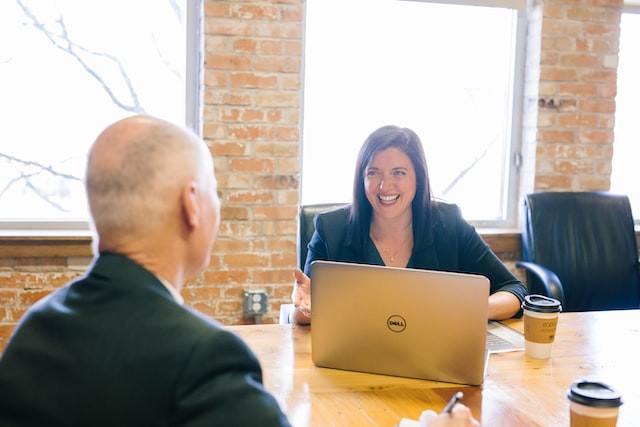Scaleup Investment: What Should Founders Expect?

The world of investment can be tricky to navigate.
Which investors would be best for your business? What type of investment fund? How do you pique the interest of investors from the get-go?
And today, with high interest rates, the cost of living, and an unsteady economy, founders and investors want to make sure that any partnership is the best investment for both parties.
But what should founders be looking for in an investor right now at this critical time?
The realities of scaleup investment
Ben Blume, a Partner at Atomico notes that recent data suggests that there's a record amount of capital that has been raised and is ready to invest.
He says: “One of the factors leading to this is that there are ever more investors. There's lots of new managers, there are growing numbers of solo GPs using new platforms to raise funds, and there are established managers raising new funds.”
Ben adds there are lots of flavours of investors and capital, so he says the first thing founders should do is really try to understand what’s out there and what they want.
“As a founder, what do you want? Do you want a specialist in your sector? Do you want someone who only invests at your stage? Do you want someone who pitches a specific kind of operational support or technical support? Or someone who is a generalist?”Once you understand this, then you’re ready to go out fundraising.
And although investor relations may sound like a function only relevant for a public company, Ben says companies should be thinking about how they build and maintain investor relationships from the very early stages.
Why founders should choose investors wisely
When you're out fundraising and speaking to investors, you want to feel comfortable asking, ‘What’s your pitch? What’s your offer?’ Turn it around and ask each investor what differentiates them.
“Then check that with other founders or people who take their investment. Do those references, use platforms like Landscape VC to do due diligence on investors.”
And once you have chosen someone to invest, Ben says it’s important to ensure that you both align on expectations - something he has learned as he’s worked with founders over time - because if you don’t have upfront conversations when you embark on an investor-founder relationship, you may be left disappointed down the line.
He adds: “If I think I'm going to be this strategic sounding board, and actually all you want is introductions, because we haven’t had that conversation upfront, we're going to both be quite frustrated at the end.”
Problem areas for founders
Are investor perspectives different today? Is there more focus on metrics? Patrick Ryan, co-founder of Odin offers his insight into what he sees when chatting to investors.
Patrick says: “I think startups are about growth.
“If you can get people buying your products and using your product; you have evidence that you can grow and that market is big, people are going to listen.
“During the Seed round, I think it’s still very much about narrative and team, and can these people do what they say they’re going to do.”
However, Patrick admits he’s lucky in his position as he’s sat on both sides of the fence, with previous experience as an investor before starting Odin.
He says: “You’ve got to remember a fund manager, even a small fund manager, if they've got a £100m fund, they need to be able to return the fund pretty much on every deal.
“And if they're hoping that 5% or 10% of deals are going to return the fund; assuming a 10% ownership; every deal needs to have the potential to be a billion dollar business; those metrics are quite difficult to puzzle out.
“Firstly, you can set your ambitions higher, but you also need to dream big and think ‘How big can this business be? And do I really want to build a business like that? If you don't, there are other options out there.”
For example, if an angel investor only writes out £50K cheques, even if they do 50 over their lifetime, that’s a two and a half million fund, so if they want to return the fund, then the returns they need to generate from a single investment look much lower, meaning Angels may choose businesses that are a bit lower risk.
Patrick says founders inevitably need to decide who’s a good fit for them.
The investor mindset
But what is the mindset of investors when chatting with founders in their early stages?
Nelly Markova, a Principal investor at Molten Ventures agrees that the Seed stage is very much about the narrative.
She says: “It's about the founding team, having the trust that you can build something big. It's about product market fit, and having metrics, and understanding the importance of having some customer feedback in terms of paying customers, especially in the current environment.
“You want to know how you want to scale your business, so we want to have some pool of metrics, so you can start putting money to work and scale the business properly.
“I think the narrative changes depending on which round you're raising, and I also think it changes depending on who you talk to."
Accessing finance outside London
It can sometimes feel difficult to break down the seemingly London-centric barriers when businesses across the UK’s scaleup ecosystem look for investment opportunities.
How can founders across the UK have those conversations? And how are investors looking to change the system to create a more harmonious ecosystem for founders and scaleups across the nation?
Patrick says: “I think hubs always develop where there's money and smart people, and that's a good place to hire and a good place to raise money. If you're not in those areas, try and identify who are the good people in the areas.
“If you're up north, for example, Pretoria Ventures does a great job of building the network and the ecosystem locally. There's good family offices and angels around them, and if you're plugged into that network, you'll meet people who work around there.
“Trying to make some noise about whatever you're doing that's going to cut through is useful as well. There's nothing like sitting down for coffee or having lunch with someone for half an hour an hour versus trying to get them on a Zoom. You can't build engagement with someone as well that way.”
Nelly adds: “I think the question is to be thoughtful about how you're going to scale the business, because we don't mind whether your business is based in Belfast, Dublin, or Manchester. But think how will you approach it afterwards?”
Patrick believes there are a few practical things founders can do, and the first thing is ensuring you have the right mindset. He says: “There's a lot of information out there. Silicon Valley is like the Athens of our time. I think it's a mindset that exists in people's heads around the world, and you need to get into that mindset so you can consume information online to get inspired.”
Patrick adds that founders should look at applying to good accelerators, like what Antler are doing in Europe, or Y Combinator for global applications, which will plug you into the right networks.
“They're a curation business. Their job is to filter through all the people from wherever they are in the world. They curate talent and put that in front of investors.”
Pieces of advice
Nelly believes there was one major factor that was forgotten during the craziness of the market last year - that launching and growing a startup is a very difficult thing.
“You're competing with a lot of corporates, with a lot of people with deep pockets. So you need to do something that is better by magnitude and more groundbreaking than any other company.
"We rarely see companies that do something incrementally better. The companies that are very successful with fundraising usually do something groundbreakingly better.
"Highlight during the pitch how it’s not just innovation, but truly groundbreaking innovation is my number one piece of advice.
“My second piece of advice is a lot of people try to change their Seed or Series A business model to show that they can be profitable. That's not the point of venture capital investing. We want to see growth, we don't need to see profitability at that stage.
“It's more about showing that the unit economics work and this is a truly efficient business; viewing the profitability element more from a unit economics perspective as opposed to showing profitability.”
And Ben offers a catchy piece of advice in that ‘a demo is worth a thousand slides.’
He says: “I look very closely at the quality of a product when I'm evaluating companies. I’d suggest any founders come ready to show the product and do a live demo. It should really be the thing that talks the most about your business and captures investor imagination.”
Patrick’s main message as a fellow founder is to ‘think big,’ but to also really think about whether you want to go down the venture funding route, as he says it comes with ‘a lot of strings attached.’
He says: “People are trying to look for very big outcomes; maybe that's not the right fit for your business. What other avenues do you have?
“There’s Angel funding. If you've got recurring revenue, you can do revenue based financing and there's more and more of that available.
“There’s equity crowdfunding platforms; if you’re a consumer business that can be a really good way to engage a network of people and get the capital you need to get going.
“But as a founder, when you’re fundraising, remember, it's a distraction. The success story is not raising the money, so make sure you don't lose sight of building a company, which is what you should focus on.”


